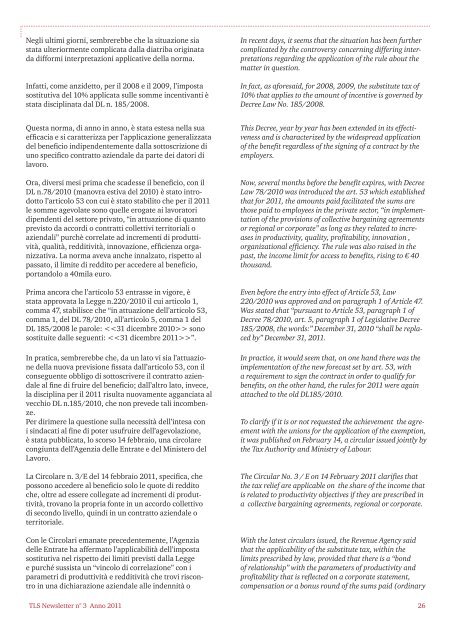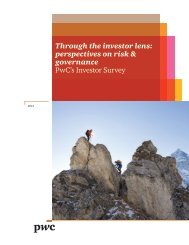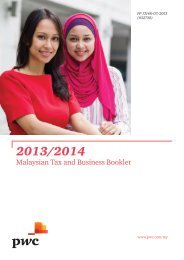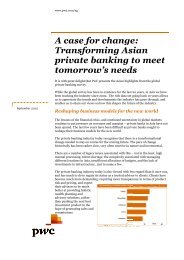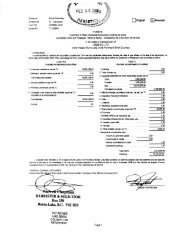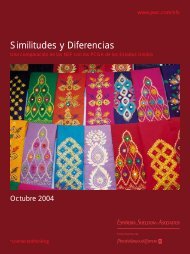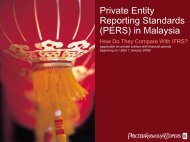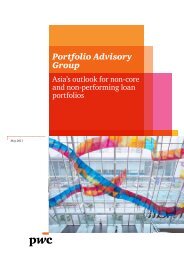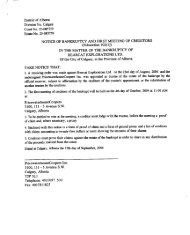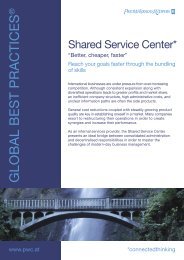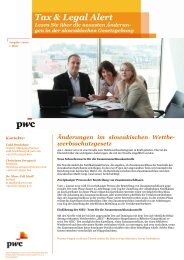TLS Newsletter 11 marzo 2011 - PwC
TLS Newsletter 11 marzo 2011 - PwC
TLS Newsletter 11 marzo 2011 - PwC
You also want an ePaper? Increase the reach of your titles
YUMPU automatically turns print PDFs into web optimized ePapers that Google loves.
Negli ultimi giorni, sembrerebbe che la situazione sia<br />
stata ulteriormente complicata dalla diatriba originata<br />
da difformi interpretazioni applicative della norma.<br />
Infatti, come anzidetto, per il 2008 e il 2009, l’imposta<br />
sostitutiva del 10% applicata sulle somme incentivanti è<br />
stata disciplinata dal DL n. 185/2008.<br />
Questa norma, di anno in anno, è stata estesa nella sua<br />
efficacia e si caratterizza per l’applicazione generalizzata<br />
del beneficio indipendentemente dalla sottoscrizione di<br />
uno specifico contratto aziendale da parte dei datori di<br />
lavoro.<br />
Ora, diversi mesi prima che scadesse il beneficio, con il<br />
DL n.78/2010 (manovra estiva del 2010) è stato introdotto<br />
l’articolo 53 con cui è stato stabilito che per il 20<strong>11</strong><br />
le somme agevolate sono quelle erogate ai lavoratori<br />
dipendenti del settore privato, “in attuazione di quanto<br />
previsto da accordi o contratti collettivi territoriali o<br />
aziendali” purchè correlate ad incrementi di produttività,<br />
qualità, redditività, innovazione, efficienza organizzativa.<br />
La norma aveva anche innalzato, rispetto al<br />
passato, il limite di reddito per accedere al beneficio,<br />
portandolo a 40mila euro.<br />
Prima ancora che l’articolo 53 entrasse in vigore, è<br />
stata approvata la Legge n.220/2010 il cui articolo 1,<br />
comma 47, stabilisce che “in attuazione dell’articolo 53,<br />
comma 1, del DL 78/2010, all’articolo 5, comma 1 del<br />
DL 185/2008 le parole: sono<br />
sostituite dalle seguenti: ”.<br />
In pratica, sembrerebbe che, da un lato vi sia l’attuazione<br />
della nuova previsione fissata dall’articolo 53, con il<br />
conseguente obbligo di sottoscrivere il contratto aziendale<br />
al fine di fruire del beneficio; dall’altro lato, invece,<br />
la disciplina per il 20<strong>11</strong> risulta nuovamente agganciata al<br />
vecchio DL n.185/2010, che non prevede tali incombenze.<br />
Per dirimere la questione sulla necessità dell’intesa con<br />
i sindacati al fine di poter usufruire dell’agevolazione,<br />
è stata pubblicata, lo scorso 14 febbraio, una circolare<br />
congiunta dell’Agenzia delle Entrate e del Ministero del<br />
Lavoro.<br />
La Circolare n. 3/E del 14 febbraio 20<strong>11</strong>, specifica, che<br />
possono accedere al beneficio solo le quote di reddito<br />
che, oltre ad essere collegate ad incrementi di produttività,<br />
trovano la propria fonte in un accordo collettivo<br />
di secondo livello, quindi in un contratto aziendale o<br />
territoriale.<br />
Con le Circolari emanate precedentemente, l’Agenzia<br />
delle Entrate ha affermato l’applicabilità dell’imposta<br />
sostitutiva nel rispetto dei limiti previsti dalla Legge<br />
e purché sussista un “vincolo di correlazione” con i<br />
parametri di produttività e redditività che trovi riscontro<br />
in una dichiarazione aziendale alle indennità o<br />
In recent days, it seems that the situation has been further<br />
complicated by the controversy concerning differing interpretations<br />
regarding the application of the rule about the<br />
matter in question.<br />
In fact, as aforesaid, for 2008, 2009, the substitute tax of<br />
10% that applies to the amount of incentive is governed by<br />
Decree Law No. 185/2008.<br />
This Decree, year by year has been extended in its effectiveness<br />
and is characterized by the widespread application<br />
of the benefit regardless of the signing of a contract by the<br />
employers.<br />
Now, several months before the benefit expires, with Decree<br />
Law 78/2010 was introduced the art. 53 which established<br />
that for 20<strong>11</strong>, the amounts paid facilitated the sums are<br />
those paid to employees in the private sector, “in implementation<br />
of the provisions of collective bargaining agreements<br />
or regional or corporate” as long as they related to increases<br />
in productivity, quality, profitability, innovation ,<br />
organizational efficiency. The rule was also raised in the<br />
past, the income limit for access to benefits, rising to € 40<br />
thousand.<br />
Even before the entry into effect of Article 53, Law<br />
220/2010 was approved and on paragraph 1 of Article 47.<br />
Was stated that “pursuant to Article 53, paragraph 1 of<br />
Decree 78/2010, art. 5, paragraph 1 of Legislative Decree<br />
185/2008, the words:” December 31, 2010 “shall be replaced<br />
by” December 31, 20<strong>11</strong>.<br />
In practice, it would seem that, on one hand there was the<br />
implementation of the new forecast set by art. 53, with<br />
a requirement to sign the contract in order to qualify for<br />
benefits, on the other hand, the rules for 20<strong>11</strong> were again<br />
attached to the old DL185/2010.<br />
To clarify if it is or not requested the achievement the agreement<br />
with the unions for the application of the exemption,<br />
it was published on February 14, a circular issued jointly by<br />
the Tax Authority and Ministry of Labour.<br />
The Circular No. 3 / E on 14 February 20<strong>11</strong> clarifies that<br />
the tax relief are applicable on the share of the income that<br />
is related to productivity objectives if they are prescribed in<br />
a collective bargaining agreements, regional or corporate.<br />
With the latest circulars issued, the Revenue Agency said<br />
that the applicability of the substitute tax, within the<br />
limits prescribed by law, provided that there is a “bond<br />
of relationship” with the parameters of productivity and<br />
profitability that is reflected on a corporate statement,<br />
compensation or a bonus round of the sums paid (ordinary<br />
<strong>TLS</strong> <strong>Newsletter</strong> n° 3 Anno 20<strong>11</strong> 26


